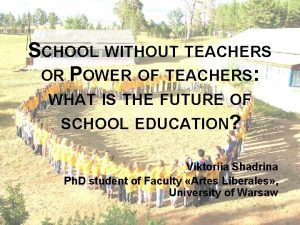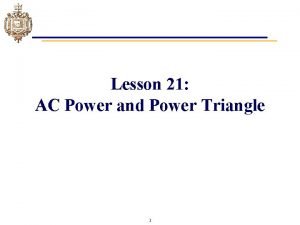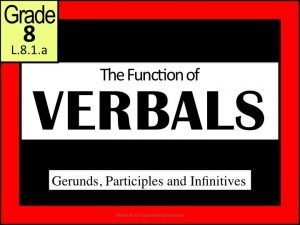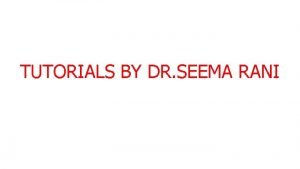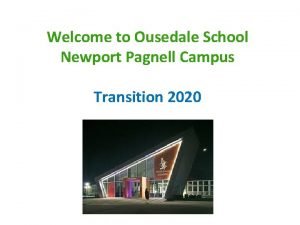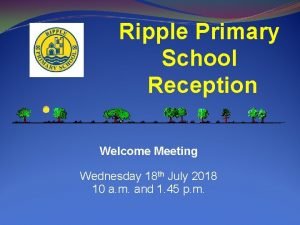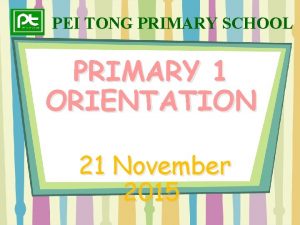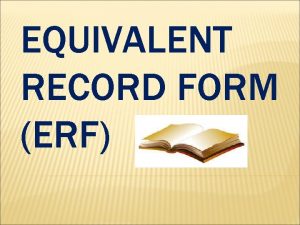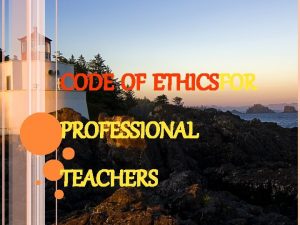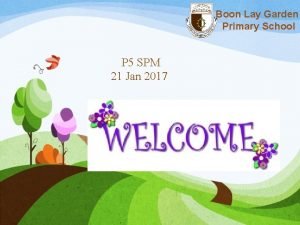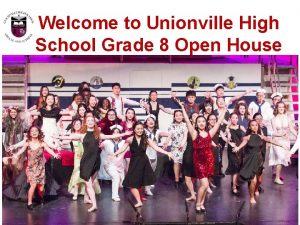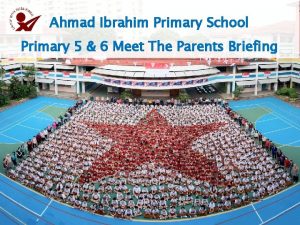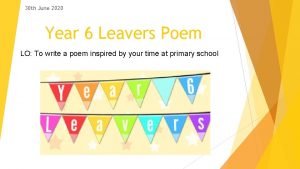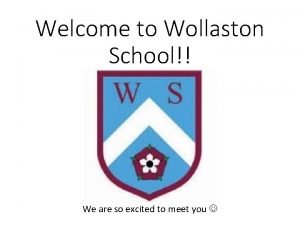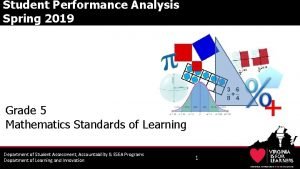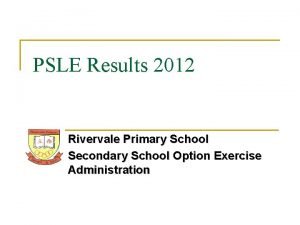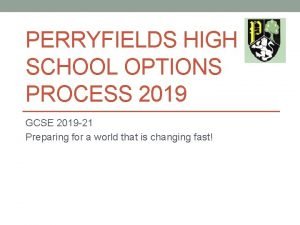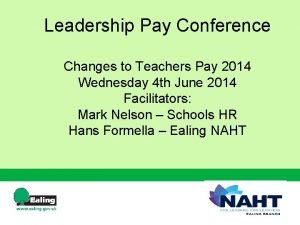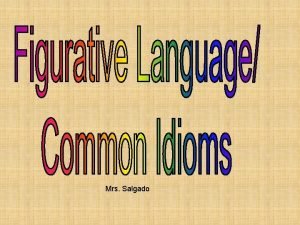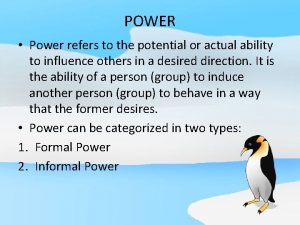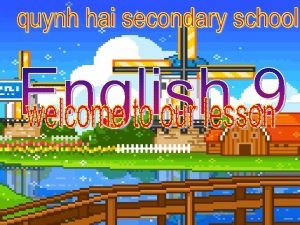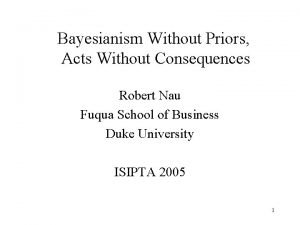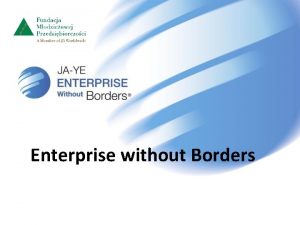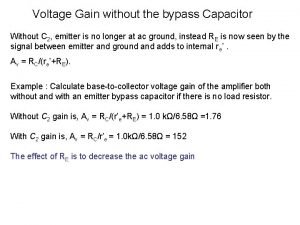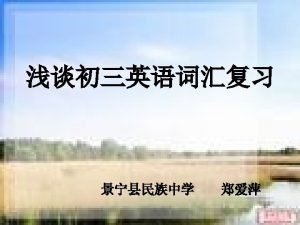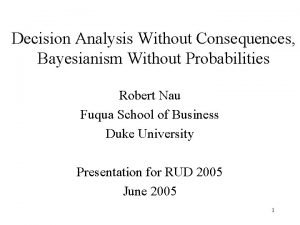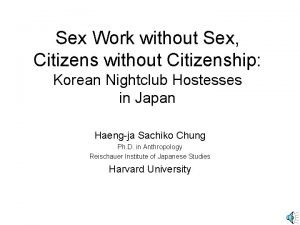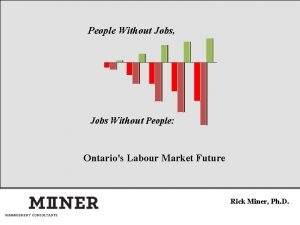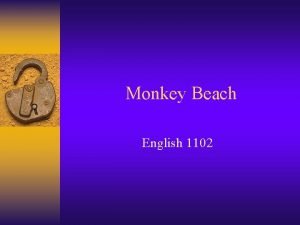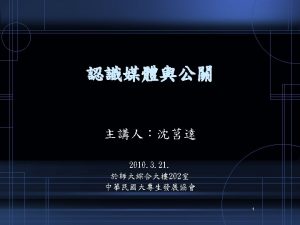SCHOOL WITHOUT TEACHERS OR POWER OF TEACHERS WHAT

























- Slides: 25

SCHOOL WITHOUT TEACHERS OR POWER OF TEACHERS: WHAT IS THE FUTURE OF SCHOOL EDUCATION? Viktoriia Shadrina Ph. D student of Faculty «Artes Liberales» , University of Warsaw

How is a teacher? A teacher (also called a schoolteacher) is a person who provides education for students. In many countries, a person who wishes to become a teacher must first obtain specified professional qualifications or credentials from a university or college. These professional qualifications may include the study of pedagogy, the science of teaching. Teachers, like other professionals, may have to continue their education after they qualify, a process known as continuing professional development. Teachers may use a lesson plan to facilitate student learning, providing a course of study which is called the curriculum. A teacher's role may vary among cultures. Teachers may provide instruction in literacy and numeracy, craftsmanship or vocational training, the arts, religion, civics, community roles, or life skills.

How is a teacher? In ancient Greece a rich family had many servants. One of the servants was in charge of caring for the children. This servant's duties included escorting the children to and from school. As a name for this servant, the Greek prefix paid-, meaning "child, " and the noun ag gos, meaning "leader, " were combined to form paidag gos. This word might be translated literally as "childleader. " The English word pedagogue can be traced to the Greek paidag gos. It is now a name for a person who leads children by teaching them, rather than just by escorting them.

How is a teacher? Religious and spiritual teachers, such as gurus, mullahs, rabbis, pastors/youth pastors and lamas, may teach texts such as the Quran, Torah or Bible. For example, in Indian culture, we call teacher “the Guru”, Gu means darkness and Ru means light; which when put the syllables together it means “a person who takes you out of the darkness in order to see light”. The primary and main aim of an ideal teacher is to prepare the student with the vision of leadership, through motivated educational system. The thought is that Mothers bring children to this World, but Teachers bring the World to them.

John Amos Comenius (1592 - 1670) Czech educational reformer and religious leader, remembered mainly for his innovations in methods of teaching. He was the first who founded and describe the system of school education. This model are working today. The main elements of the model are classroom, lessons, pupils and teachers. In his Didactica Magna (Great Didactic), he outlined a system of schools that is the exact counterpart of the existing American system of kindergarten, elementary school, secondary school, college, and university

THE CONTEMPORARY SYSTEM OF SCHOOL EDUCATION IS NOT NEW. IT WAS FOUNDED IN TIME WHEN WERE MANUFACTORIES AND MANUAL LABOR. BUT WE ARE LIVING IN POSTMODERN WORLD! THEREFORE, THIS SYSTEM IS OUTDATED AND NO LONGER NEEDED. FUTURE OF SOCIETY WILL BE WITHOUT SCHOOLS, WITHOUT TEACHERS.

Ivan Illich (1926 – 2002) He was an Austrian philosopher, Roman Catholic priest, and "maverick social critic“ of the institutions of contemporary Western culture and their effects on the provenance and practice of education, medicine, work, energy use, transportation, and economic development. The book that brought Ivan Illich to public attention was Deschooling Society (1971), a radical critical discourse on education as practiced in "modern" economies. Giving examples of what he regards as the ineffectual nature of institutionalized education, Illich posited self-directed education, supported by intentional social relations

Ivan Illich (1926 – 2002) «Universal education through schooling is not feasible. It would be no more feasible if it were attempted by means of alternative institutions built on the style of present schools. Neither new attitudes of teachers toward their pupils nor the proliferation of educational hardware or software (in classroom or bedroom), nor finally the attempt to expand the pedagogue's responsibility until it engulfs his pupils' lifetimes will deliver universal education. The current search for new educational funnels must be reversed into the search for their institutional inverse: educational webs which heighten the opportunity for each one to transform each moment of his living into one of learning, sharing, and caring. We hope to contribute concepts needed by those who conduct such counterfoil research on education--and also to those who seek alternatives to other established service industries» (Deschooling society. Proportionality and the Contemporary World, 1971)

Sir Kenneth Robinson (1950) He is an English author, speaker and international advisor on education in the arts to government, non-profits, education and arts bodies. He addresses the fundamental economic, cultural, social and personal purposes of education, and argues that education should be personalized to every student's talent, passion, and learning styles, and that creativity should be embedded in the culture of every single school. Sir Ken Robinson’s ideas about education: 1. Schools kill children’s innate creative talents because… 2. The school system priorities academic ability. 3. The system neglects other intelligences. 4. Creativity is as important as literacy. 5. Subject hierarchies of English, math & science over drama, dance & art are damaging.

Sir Kenneth Robinson - - The main of his works: The Arts in Further Education (1986) - Out of Our Minds (2001) - The Element (2009) Finding Your Element (2013) His performances on www. TED. com: 1) 2) 3) 4) https: //www. ted. com/talks/ken_robinson_says_schools_kill_creativity https: //www. ted. com/talks/ken_robinson_changing_education_paradigms https: //www. ted. com/talks/sir_ken_robinson_bring_on_the_revolution https: //www. ted. com/talks/ken_robinson_how_to_escape_education_s_de ath_valley

Schools in the Cloud. Learning without teachers In 1999, Sugata Mitra's pioneering “Hole in the Wall” experiments helped bring the potential of self-organised learning to the public's attention. Fourteen years of research since then continue to support his startling results — groups of children, with access to the Internet, can learn almost anything by themselves. His innovative and bold efforts towards advancing learning for children all over the world earned him the first ever one million dollar TED Prize award. At the 2013 TED conference, Sugata asked the global TED community to make his dream a reality by helping him build the ultimate School in the Cloud where children, no matter how rich or poor, can engage and connect with information and mentoring online. (https: //www. theschoolinthecloud. org)

Sugata Mitra (1952) He is Professor of Educational Technology at the School of Education, Communication and Language Sciences at Newcastle University, England. He is best known for his "Hole in the Wall" experiment, and widely cited in works on literacy and education. He is also the winner of the TED Prize 2013 (http: //www. ted. com/participate/ted-prize/prize -winning-wishes/school-in-the-cloud-sugatamitra). Mitra is a leading proponent of Minimally invasive education. He has a Ph. D in Physics and is credited with more than 25 inventions in the area of cognitive science and education technology. His interest in the human mind once again led him into the areas of learning and memory. Since the 1970 s, Professor's publications and work has resulted in training and development of perhaps a million young Indians, amongst them some of the poorest children in the world.

How are learning children? There are different ways for it. The main approaches are formal and informal education. The effective education process is based on motivation children. If child don't want to study he would virtually unteachable. Other hand education must be systematic and varied. Therefore main of children need a special mentor who can work with them.

Analyze of views to modern educational ideas 1) Do Kids Really Need Teachers? (http: //www. theatlantic. com/national/archive/2013/0 2/do-kids-really-need-teachers/273557/) 2) What Sir Ken Got Wrong? (http: //pragmaticreform. wordpress. com/2013/10 /12/what-sir-ken-got-wrong/) 3) CLASSICAL VS. MODERN EDUCATION: The Principal Difference (http: //classicalhomeschooling. com/classicalhomeschooling-second-issue/classical-vsmodern-educationthe-principal-difference/) 4) and etc.

Global teacher shortage threatens progress on education The world urgently needs to recruit more than 8 million extra teachers, according to UN estimates, warning that a looming shortage of primary school teachers threatens to undermine global efforts to ensure universal access to primary education by 2015. At least 2 m new teaching positions will need to be created by 2015, the UN said in the report. An additional 6. 2 million teachers will need to be recruited to maintain current workforces and replace those expected to retire or leave classrooms due to career changes, illnesses, or death (http: //www. theguardian. com/global-development/datablog/2011/oct/07/unestimate-teachers-shortage-worldwide)

A TEACHER FOR EVERY CHILD: Projecting Global Teacher Needs from 2015 to 2030 According to new global projections from the UNESCO Institute for Statistics, chronic shortages of teachers will persist beyond 2015 for decades to come if current trends continue. In total, the world will need an extra 3. 3 million primary teachers and 5. 1 million lower secondary teachers in classrooms by 2030 to provide all children with basic education. Teachers play a critical role in enabling students to achieve good learning outcomes within effective education systems. While their ability to positively shape a child’s learning experience depends on a myriad of factors, the first step towards good learning outcomes is to ensure that there are enough teachers in classrooms. (http: //www. uis. unesco. org/Education/Documents/fs 27 -2013 teachers-projections. pdf)

Power of Teachers are an integral part to quality education. As the leader of a classroom, teachers drive classroom instruction and community making them a natural partner in improving the quality of learning. Around the world teachers are often required to obtain specialized education, knowledge, codes of ethics and internal monitoring. Every child needs a teacher! (http: //www. campaignforeducation. org/docs/reports/ECNAT%20 Report_RGB. pdf)

FUNCTIONS AND ROLES OF TEACHERS Broadly speaking, the function of teachers is to help students learn by imparting knowledge to them and by setting up a situation in which students can and will learn effectively. But teachers fill a complex set of roles, which vary from one society to another and from one educational level to another. Some of these roles are performed in the school, some in the community (http: //www. britannica. com/EBchecked/topic/585183/teaching/39100/Functionsand-roles-of-teachers)

FUNCTIONS AND ROLES OF TEACHERS Roles in the school or university • Mediator of learning • Disciplinarian or controller of student behaviour • Parent substitute • Confidant to students • Judge of achievement • Organizer of curriculum • Bureaucrat • Scholar and research specialist • Member of teachers’ organization Roles in the community • Public servant • Surrogate of middle-class morality • Expert in some area of knowledge or skills • Community leader • Agent of social change

Roles & Responsibilities of Teachers 1) Cultural Organizers explains that teachers must be competent in understanding the dynamics and uses of culture in their classroom. Daily classroom activities should facilitate learning environments that reflect cultural and ethnic diversity while also promoting academic achievement for all. Students from different ethnic groups should be able to voice their cultural expression in order to enhance content and learning processes. 2) Cultural Mediators should expose students to multiple perspectives and allow students to critically analyze differences between mainstream cultural ideals and those of different cultural systems. Teachers guide students to reflect on their own ethnic identities and facilitate them in honoring other cultures and developing positive cross-cultural relationships. Classroom activities should enhance students' abilities to identify stereotypes and prejudices and also teach students how to avoid perpetuating racism

Roles & Responsibilities of Teachers 3) Orchestrators of Social Contexts also asserts that it is very important for teachers to appreciate the impact culture has on learning. Furthermore, they must make their teaching wellsuited to the sociocultural contexts and frames of reference of ethnically diverse students. They are also guides in helping students know how to utilize their cultural cognition in order to facilitate their learning. Following is Spring's (1995) definition of a cultural frame of reference, "those elements that cause a cultural group to interpret the world. . . in a particular manner" (p. 5), or the filter through which perceptions of, encounters with, and understandings of the outside world are ordered and made meaningful (Gay, G. (2000). Culturally Responsive Teaching: Theory, Research, & Practice. New York: Teachers College Press)

Teacher Personality Which characteristics make a great teacher? 1. Empathy 2. Enthusiasm 3. Creativity 4. Dedication 5. Discipline One of the truest marks of a good teacher is the ability to bring out the best in students. A good teacher recognizes their students’ potential to become great people, and they inspire them to be just that.

"Investing in teachers means investing in the future” Joint message (ILO, UNESCO, UNICEF, UNDP, Education International) for the World Teachers’ Day. 5 October 2014 marked the 20 th anniversary of World Teachers’ Day, which commemorates the adoption of the ILO/UNESCO Recommendation concerning the status of teachers in 1966.

An education system is only as good as its teachers. Teachers are essential to universal and quality education for all: they are central to shaping the minds and attitudes of the coming generations to deal with new global challenges and opportunities. Innovative, inclusive and results-focused teaching is crucial for 2015 and beyond if we are to provide the best possible opportunities for millions of children, youth and adults worldwide.

THANK YOU FOR YOUR ATTENTION
 School without teachers
School without teachers Triangle of power
Triangle of power Kim kroll teachers pay teachers
Kim kroll teachers pay teachers Without title by diane glancy
Without title by diane glancy Without title for my father who lived without ceremony
Without title for my father who lived without ceremony Justify the title of keeping quiet
Justify the title of keeping quiet Ousedale school term dates
Ousedale school term dates Ripple primary school holidays 2021
Ripple primary school holidays 2021 Pei tong primary school
Pei tong primary school Requirements for teacher 3 erf
Requirements for teacher 3 erf Resolution 435 of the prc
Resolution 435 of the prc Lau whee sien
Lau whee sien Unionville high school principal
Unionville high school principal Ahmad ibrahim primary school teachers
Ahmad ibrahim primary school teachers Primary school year 6 leavers poem
Primary school year 6 leavers poem Wollaston secondary school
Wollaston secondary school The math department at a small school has 5 teachers
The math department at a small school has 5 teachers Meridian secondary school uniform
Meridian secondary school uniform Rivervale secondary school
Rivervale secondary school Perryfields high school teachers
Perryfields high school teachers School teachers pay and conditions document
School teachers pay and conditions document Duncanrig secondary school
Duncanrig secondary school Language
Language Solar power satellites and microwave power transmission
Solar power satellites and microwave power transmission Potential power
Potential power Flex28024a
Flex28024a
